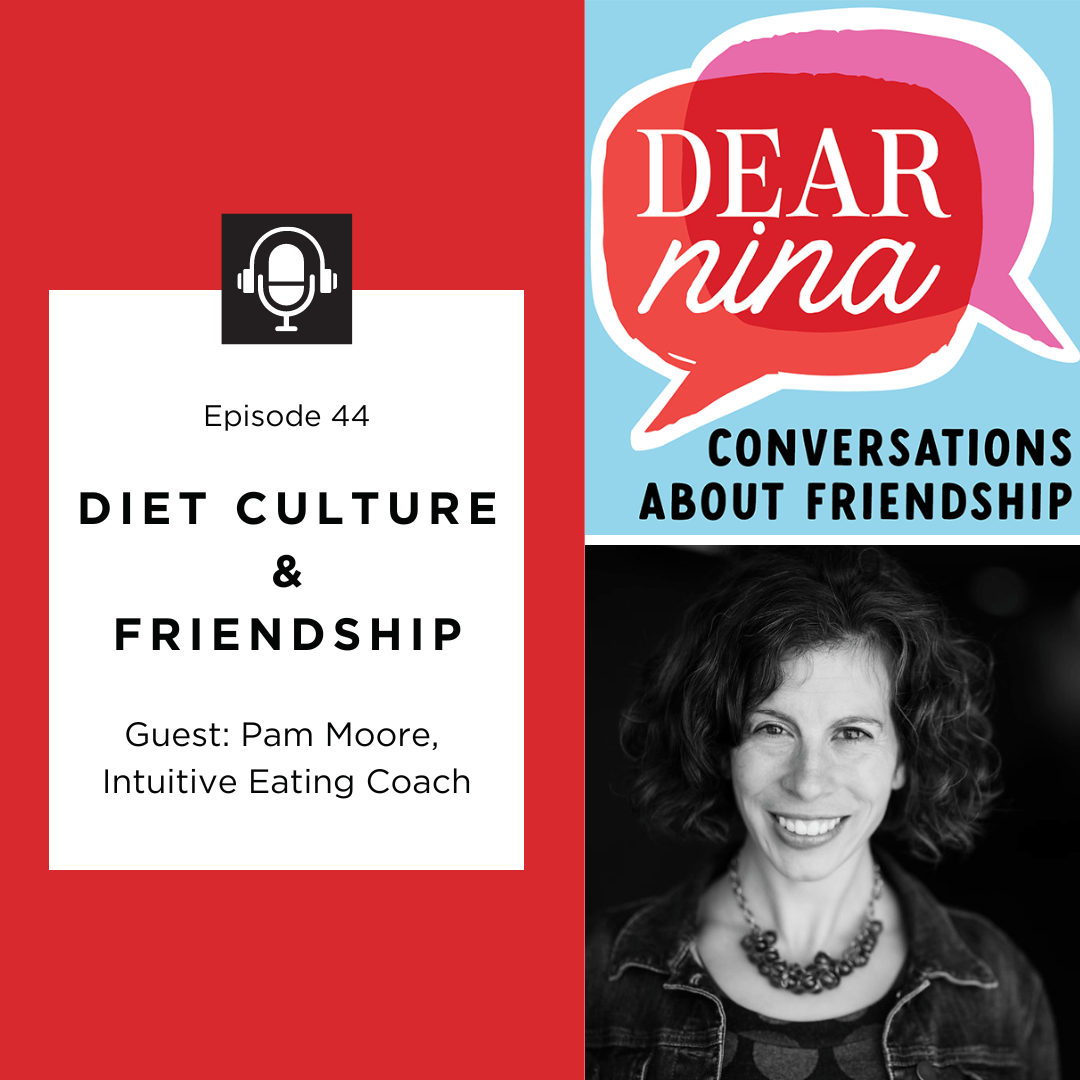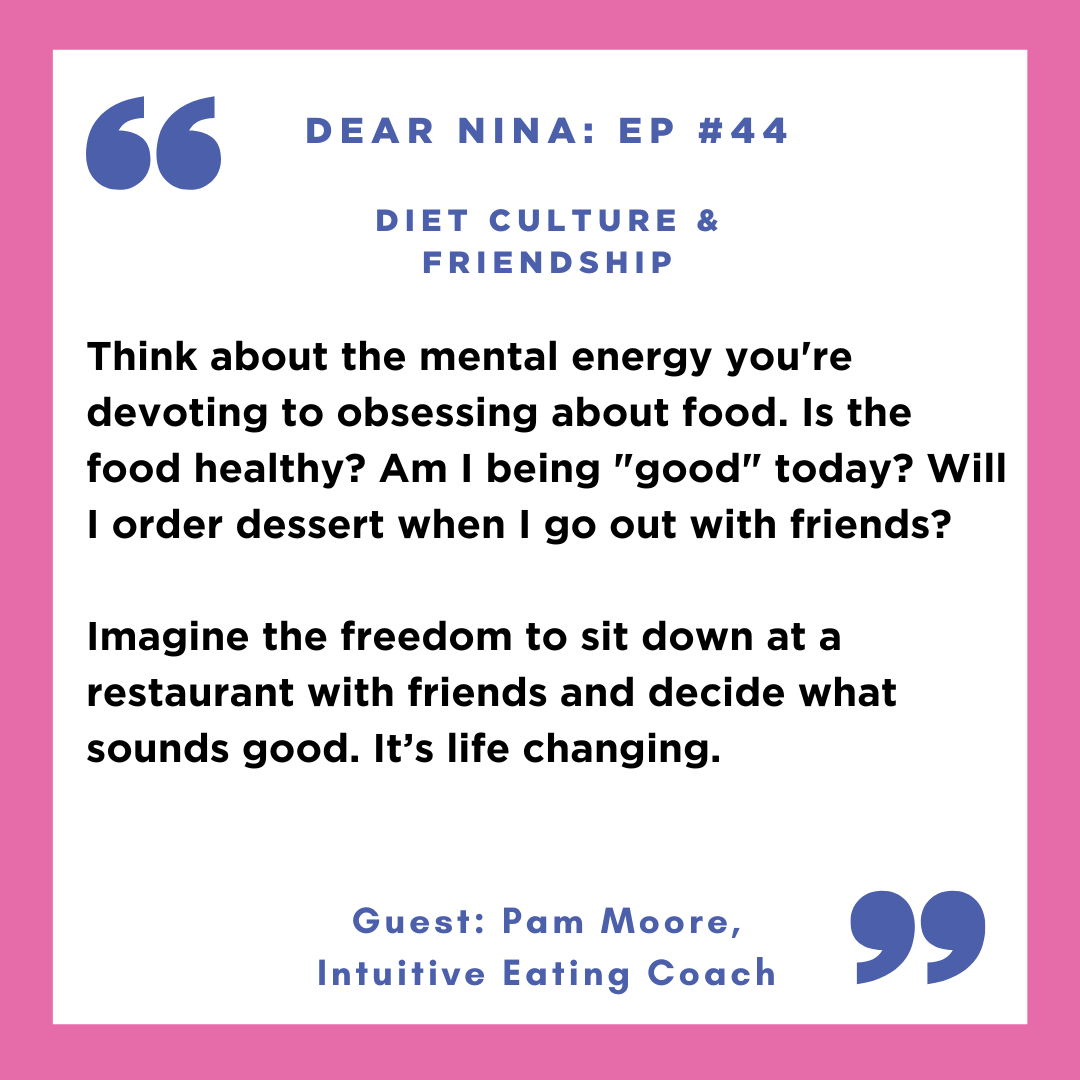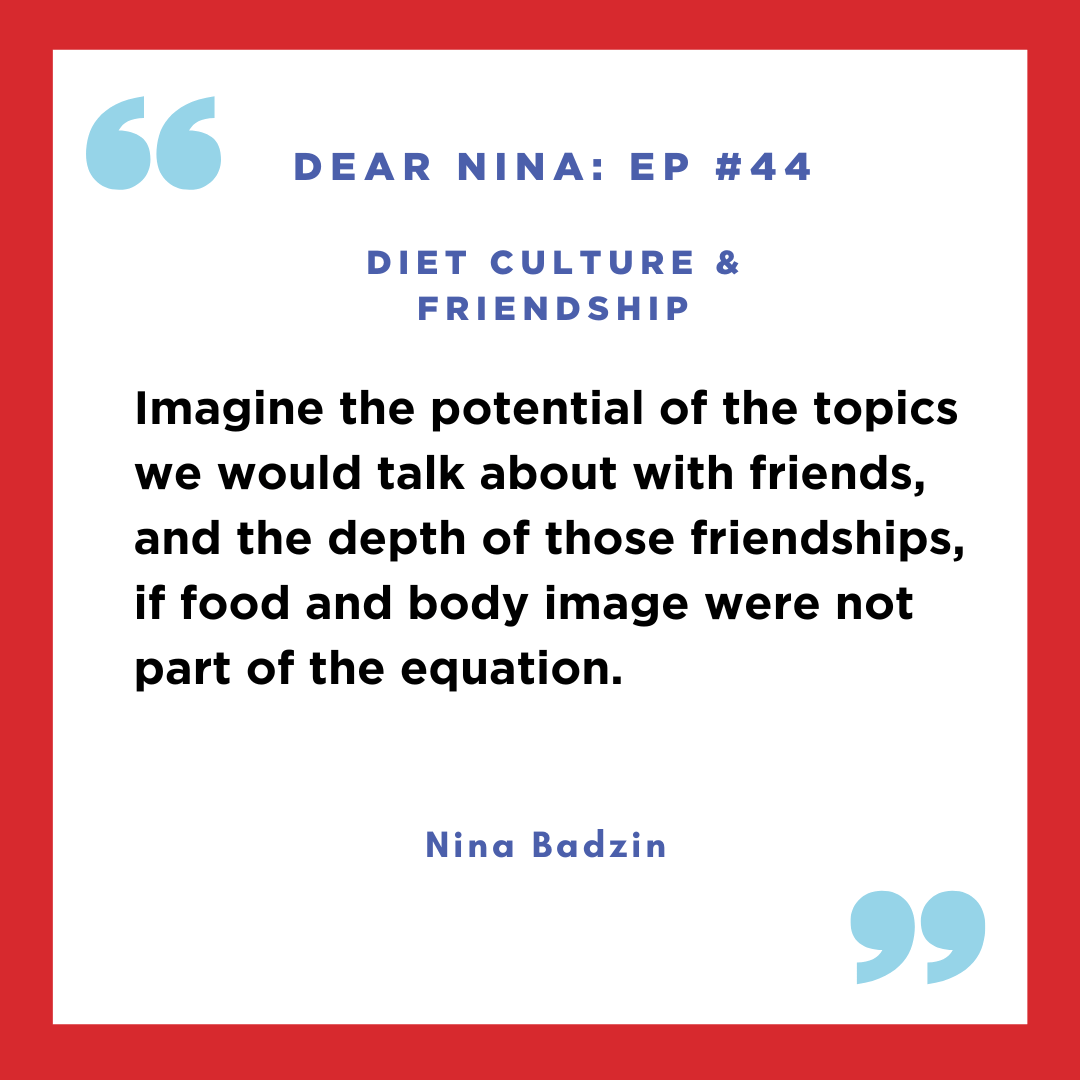Diet Culture and Friendship
Today’s topic on Dear Nina, inspired more emails from my Facebook group–Dear Nina: The Group–than any other topic since I started the podcast. What do I mean by diet culture and friendship? I’m referring to how the culture of dieting and the worship of thinness affects friendships, can become competitive, and is spread among friends. We also discussed friends being overly invested in and overly influenced by each other’s decisions about food.
My guest, Pam Moore, is an intuitive eating coach, and she helped me dissect the food issues that are so pervasive, especially for women.
FIND EPISODE #44 ON APPLE PODCASTS, SPOTIFY, OR ANYWHERE YOU LISTEN TO PODCASTS!
Meet Pam Moore
Pam Moore is an occupational therapist-turned-intuitive eating coach and health and fitness journalist. As an intuitive eating coach, her mission is to help women detach their self-worth from their weight and to move their bodies because it feels good — not as a punishment.
The author of There’s No Room for Fear in a Burley Trailer, Pam’s writing has also been published in The Washington Post, Runner’s World, SELF, The Guardian, Time, Outside, AARP, and Forbes, among others.
Despite, or more likely because of being picked last for every team as a kid, Pam is also a certified personal trainer, six-time marathoner, and two-time Ironman finisher. Her podcast, Real Fit, features conversations with women athletes about body image, enoughness, and more.
You can learn more at:
pam-moore.com, LinkedIn, TikTok, Instagram, Twitter
Highlights from my conversation with Pam:
I got some beautifully written, heart-wrenching letters from listeners when I said I wanted to hear what came to their minds when I say the words, “diet culture and friendship.” While all the letters I received were different, they did have a few obvious things in common.
#1. An initiation into the world of dieting at a young age
#2. Friendships that revolved around eating, or not eating
#3. Feeling jealous of friends who seemed to have their eating “under control”
#4. Feeling fed up with friends who are obsessed with dieting
#5. Sensing that friends were jealous and even angry when they lost weight
#6. The struggle to get out of the all or nothing mindset so prevalent around dieting and especially for women
Let’s first explore what diet culture means.
Pam said,
Diet culture is the subtle messages and not so subtle messages that thinner is more attractive and healthy. And also the message that some foods are “good” and some are “bad.” . . . The idea that bigger bodies are somehow wrong–that’s diet culture, and it’s coming at us from everywhere.
The one letter I read in the episode is below.
I felt this letter represented the others very well.
Dear Nina,
I had a weight problem for 25 years, from age 15 to age 40. I was in the working world and had a lot of friends — we’d diet and binge together. We all lost weight from time to time and then we all gained it back. I got heavier over time. Work was an opportunity to go to lunch with one particular friend and we’d call each other to arrange it and one of the questions was, “Are you dieting or bingeing?” The dieting friend of course could be no fun at lunch, couldn’t split a dessert, would make a big fuss about the diet. We’d join and quit Weight Watchers, etc. This was a big part of our relationship, both hating our bodies and wanting to change them while at the same time wanting to keep that connection to the world of dieting women.
When I was forty, I joined a 12-step program geared towards compulsive eating. I’ve been in the program now and in recovery for 22 years and 4 months. I lost 90 pounds and kept it off for the majority of the last 22+ years. It took me about 18 months to lose the weight. Clearly, from the very beginning, there was something very different going on. There was no gaining it back, none of the drama that fueled that work friendship and others. This had a profound effect on my friendships that were built on bingeing and dieting. Suddenly I was no longer doing those things, didn’t want to, and was really changing from the inside out. All that drama was gone about “starting a new diet” and “what diet are you on?”
I think I understood at some point that I wasn’t supposed to find a cure for this problem, that these friendships were based on a certain amount of mutual misery and hatred of our bodies. My neighbor friend once revealed to me that she considered us the “fat moms” of the neighborhood and she didn’t want to be the only one. At Bunco parties she’d make things “especially for me” that I couldn’t and wouldn’t eat. That friendship in particular ended with us meeting for lunch, her getting there early and eating her entire meal before I got there and then sitting there watching me eat.
That friendship ended and so did the work friendship.
— Pam and I spoke about our own memories of friendships based around dieting, or our own envy of friends who looked a certain way. We acknowledged that friends influenced how we felt about our bodies and influenced how we ate. We acknowledged that we probably passed along those same issues to other friends.
— Elements of the letter writer’s decision to give up dieting reminded us of episode 17 with Jen Gilhoi, who spoke about how giving up alcohol affected her friendships.
— The body positivity culture that exists today seems hopeful. We wondered (hoped!) that teens have healthier mindsets about it all, but we have our doubts–such is the pervasiveness of diet culture.
— We reminisced about past food trends (the 90s fat free crazy) and discussed current ones (intermittent fasting, Whole30, Keto, “clean” eating) and how it’s hard not to be sucked into a friend’s new diet.
— Pam spoke a lot about how intuitive eating works and how attempts to undo the mental and physical harm of diet culture.
— Women are supposed to be thin, but not be working too hard at it. It’s an impossible standard to uphold.
— It’s not uncommon for people who depriving themselves of food to be obsessed with all things food related.
Let’s connect!
- Here’s my Substack newsletter about friendship & more
- JOIN the Dear Nina Facebook group
- Ask an anonymous question
If you like what you’re hearing, please tell a friend!
Also, if you can rate and/or leave a review on Apple Podcasts, I’d be so grateful.
Latest posts by Nina Badzin (see all)
- 5 Friendship Issues to Consider Addressing with a Therapist - April 17, 2024
- Subtle Friendship Slights and Changing Your Instagram Handle - April 10, 2024
- The Courage to Trust Friends After You’ve Been Hurt - April 2, 2024
- Why Big Friend Groups Often Fail: Dr. Lisa Damour - March 25, 2024




